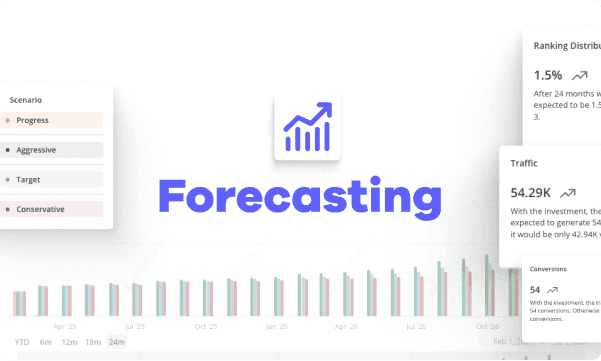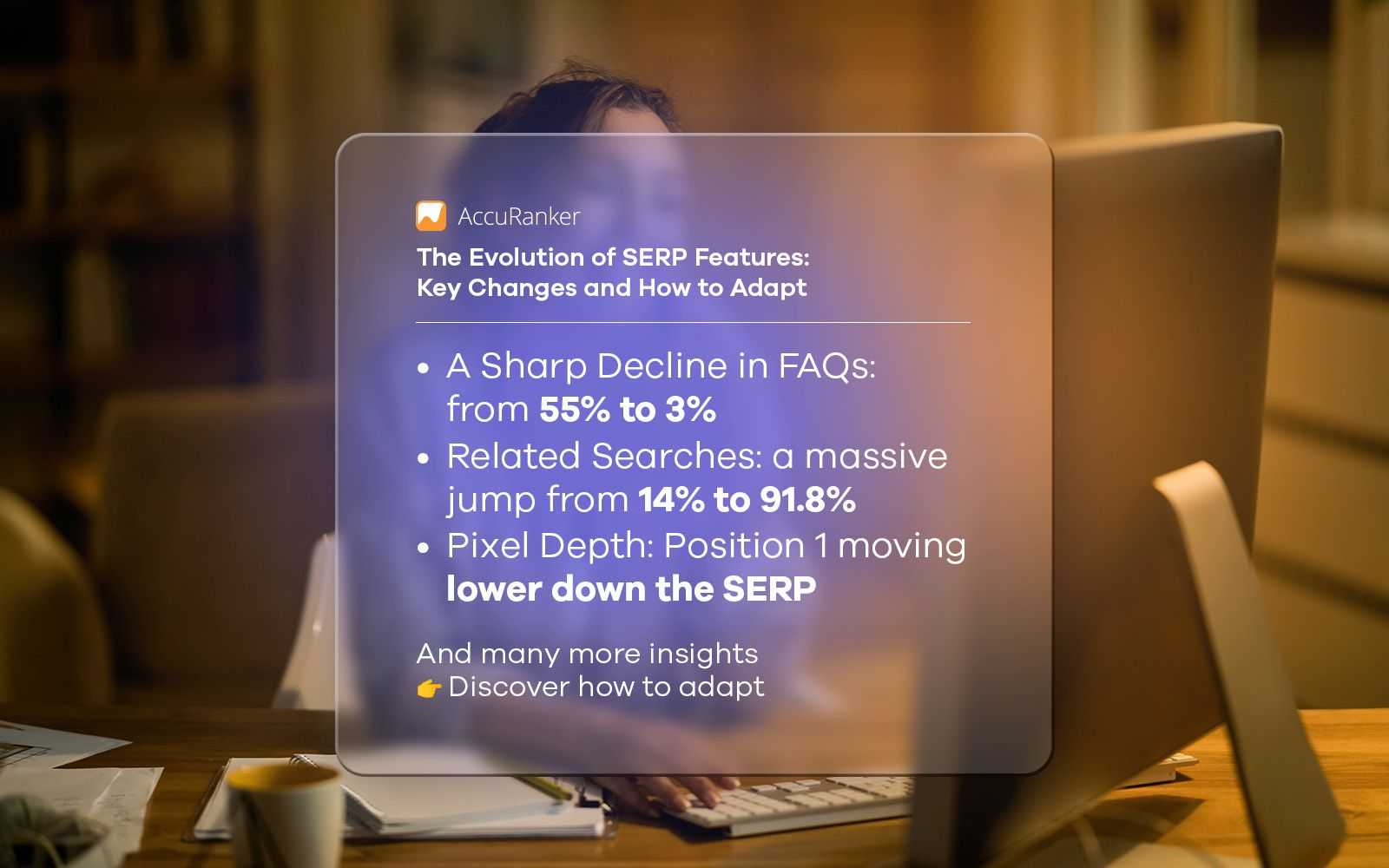SEO Report: What Is and How to Do It
Last updated on Saturday, October 7, 2023

An SEO report is a document that outlines strategies and tactics used to boost website traffic.
It also provides insight into the progress of marketing campaigns, as well as ranking and visibility improvements over time.
It should be comprehensive, easy to read, and provide actionable insights that can drive future decisions.
So, without further ado, let's see what an SEO report is and how to properly do it.
What Is an SEO Report?
An SEO report is a technical document.
It should give accurate and detailed information on the SEO performance of a given website.
In other words, it allows a digital marketing agency or an experienced professional to communicate the results of the activities related to search engine optimization that are carried out for customers.
Basically, this solution is already included in the employment contract that the website owner signs before starting analysis and optimization.
This includes improving keyword rankings, increasing organic visibility, or decreasing bounce rates.
Why Is an SEO Report Important?
The SEO report is not important. It is essential.
For any type of company or online business that wants to understand how to optimize its online strategy.
A good SEO report should provide insights into the performance of the website and how it can be improved.
It can also help to identify opportunities that may not have been explored yet, as well as potential areas of improvement.
In addition, it should:
Return information on the status of the website analyzed
Monitor any changes and developments related to a pre-established period of time
Give useful information on the marketing campaigns done
Highlight critical or positive aspects of the site
Detect what are the trends of users.
Also, keep in mind that SEO reports also play a central role in ROI evaluation.
What Are the KPIs to Consider?
The KPIs you should include in your SEO report will depend on the goals of the website.
At a minimum, it should include:
Visitor numbers (unique visitors & total visits)
Click-through rate (CTR)
The number of pages indexed by search engines
Keyword rankings (positioning on SERPs)
Bounce rate
Organic traffic
Time on site
You should also consider adding metrics such as average visits per page, number of conversions, and cost per acquisition. This will help you understand the effectiveness of your SEO strategy and make sure it is in line with your goals.
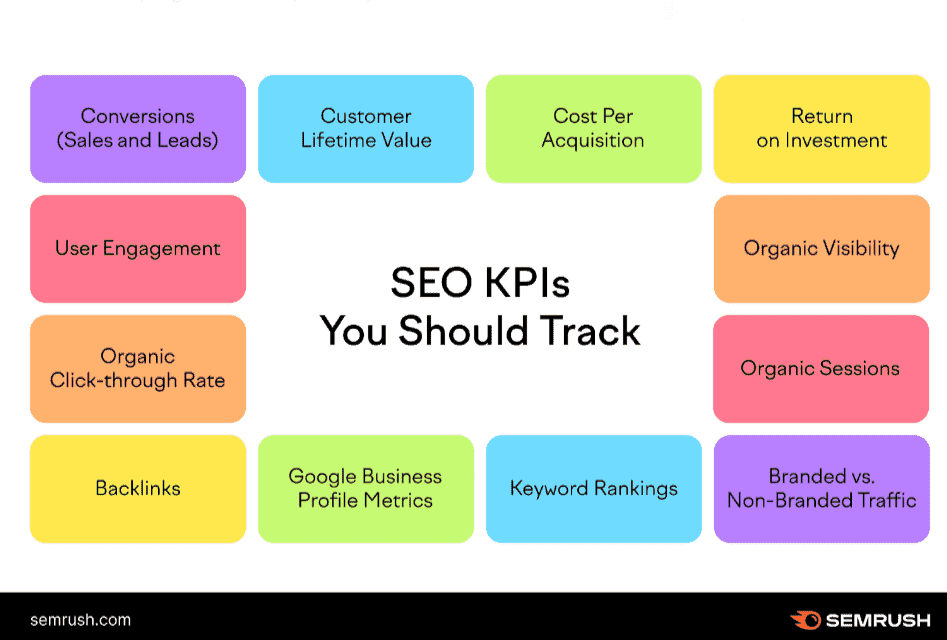
What Are the Sections of a Good SEO Report?
The structure of the SEO report must be well organized.
It should include:
Executive Summary. A brief overview of the report.
Keywords Performance. Ranking of current keywords, organic visibility, and impressions. It should also analyze opportunities for improvement in ranking or position for new ones.
Traffic Analysis. The number of organic visitors to the website, their sources, and behavior.
Technical Analysis. The site structure, loading speed, presence of broken links, and mobile optimization should be included.
Content Optimization. The report should include an analysis of the published content, duplication checks, and analysis of internal linking.
Competitor Analysis. To understand how others are performing in comparison with the website.
Performance Analysis. The report should include data on ROI, conversions, or any other metric relevant to the performance of a campaign.
Recommendations and Tactics. This section must provide information about what needs to be done in order for the website to achieve better results.
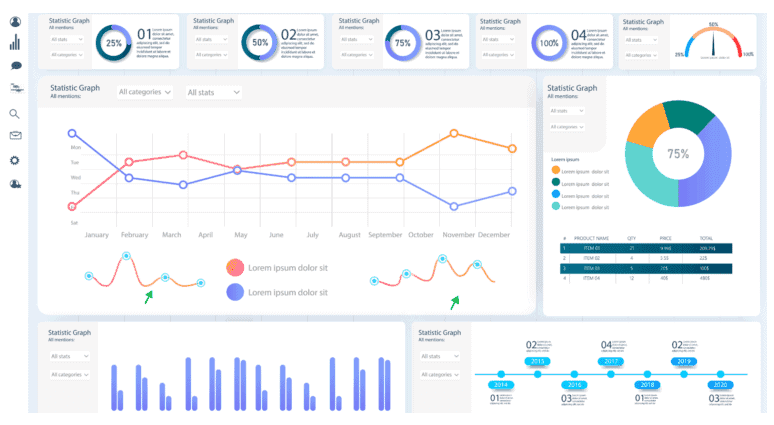
How Can You Create an SEO Report?
Creating an SEO report requires some knowledge of the industry.
Fortunately, there are tools that can help you with this task such as Google Analytics or SEMRush.
Once you have a tool in place, here is an overview of the process:
Identify your goals
Gather data
Create a structure
Analyze the data
Visualize the insights
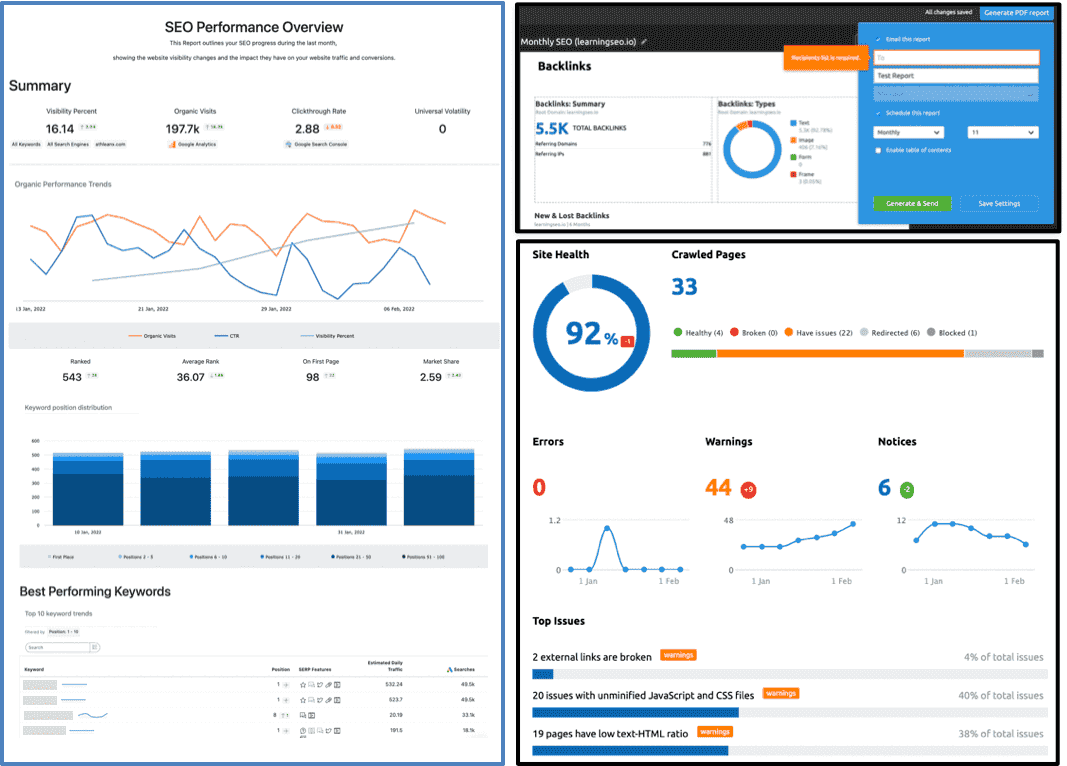
Identify Your Goals
Before starting the process of creating an SEO report, it is important to clearly identify your goals. This will help you determine which metrics and data points are most relevant for your report.
Some common goals for SEO include increasing website traffic, improving search engine rankings, or generating leads.
To Identify yours, consider your overall business objectives and how SEO can support them.
Remember that a goal should be:
A vision for the future: what you want to achieve
Measurable: so it can be tracked and assessed
Time-sensitive: set a timeline for achieving your goal
Gather Data
Once you have identified your goals, it’s time to gather the data. Start by collecting all the necessary information: keyword rankings, organic traffic, impressions, etc.
Depending on your goals, you may also want to gather data from other sources such as social media or backlink analysis tools.
Make sure that the data you collect is accurate and up-to-date. This will ensure that your report provides a clear picture of your website's performance.
Use tools like Google Analytics or SEMRush to streamline the data-gathering process.
Create a Structure
After gathering all the necessary data, it’s time to create a structure for your report. A good structure will make it easier to analyze and understand the data. Some key elements that should be included in any SEO report are:
Summary of Goals: Recap of what you want to achieve with SEO
Overview of the Period: The time frame for which the report is being generated
Key Metrics: The main data points that support your goals (e.g. traffic, rankings, conversions)
Comparison with Previous Periods: Show how your website's performance has changed over time
Insights and Recommendations: A section to highlight key findings and suggest actions for improvement
Analyze the Data
With a clear structure in place, it’s time to analyze the data. This involves looking at each metric and identifying trends, patterns, or anomalies.
For example, if your goal is to improve website traffic, you may want to look at which channels are driving the most traffic or which countries your visitors are coming from.
This step is important because it can reveal insights that will help you refine your SEO strategy.
Visualize the Insights
Finally, to make the data more digestible, it’s important to present it in a visual format. Data visualization allows you to present complex data in a more engaging and easier-to-understand way.
Charts, graphs, and tables can help highlight patterns or trends that may not be as obvious when looking at raw numbers.
Visualizing the insights also makes it easier for stakeholders to understand the data and see the impact of your SEO efforts.
Using a White-Label SEO Report
Creating an SEO report from scratch can be time-consuming and challenging. That’s why more and more businesses are turning to white-label SEO reports.
These reports provide a quick and easy way to generate high-quality reports in minutes. All you need to do is enter your data and the software will generate the report for you.
These reports are also easily customizable, so you can add your own branding and personalize the design to match your company’s style. Plus, they offer insights into website performance, keyword rankings, organic traffic, technical analysis, and more.
In addition to aggregating relevant SEO data, white-label reports visualize the data in a way that is both eye-catching and easy to comprehend. You can make an eye-catching presentation to enhance the reports and present your SEO data to an audience.
FAQs
Q: How can I get free SEO reports?
A: You can use free tools like Google Analytics or SEMRush to generate basic SEO reports. However, for more comprehensive and customizable reports, you may need to invest in white-label SEO report software.
Q: What are the most important metrics to include in an SEO report?
A: The most important metrics will depend on your specific goals and objectives. However, some key metrics to consider include website traffic, keyword rankings, conversion rates, and backlink analysis.
Q: How often should I generate an SEO report?
A: The frequency of generating an SEO report will depend on your business needs. Generally, it is recommended to generate a report at least once a month to track progress and make necessary adjustments to your SEO strategy. However, you may choose to generate reports more frequently if needed.
Q: How do I get SEO reports from Google?
A: To get SEO reports from Google, you can use tools like Google Analytics and Google Search Console. These platforms provide data and insights on website traffic, keyword rankings, and other important metrics that can help in creating an SEO report. You can also set up automated reporting within these tools to receive regular updates on your website's performance. Additionally, you can use Google Data Studio to create customized SEO reports using data from Google Analytics and other sources.
Q: What does an SEO report look like?
A: A typical SEO report will include a summary of goals, an overview of the reporting period, key metrics and their comparison to previous periods, insights and recommendations, and visualizations of data. However, the exact format and content may vary depending on the purpose of the report and the preferences of the creator. Overall, an SEO report should present data in a clear, organized, and visually appealing manner.
Final Words
Creating an SEO report is a complex process, but it can pay off in the long run.
By gathering the right data and analyzing it with the help of software tools such as white-label reports, you can create comprehensive SEO reports that will give you actionable insights into your website’s performance.

Article by:
Erik Emanuelli
Blogger
Erik Emanuelli has been in the online marketing game since 2010. He’s now sharing what he has learned on his website. Find more insights about SEO and blogging here.
